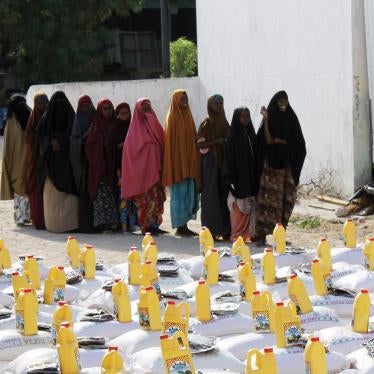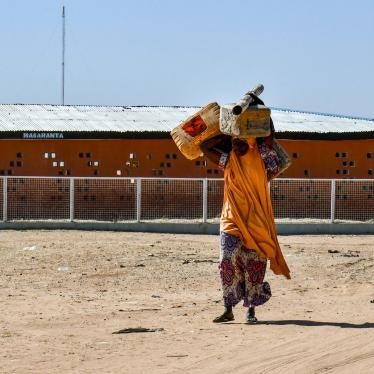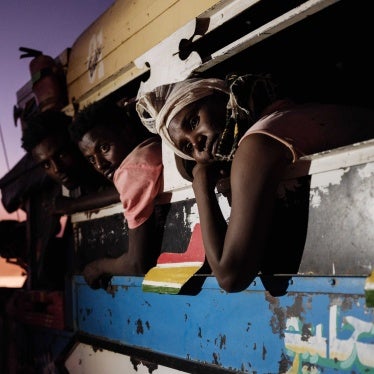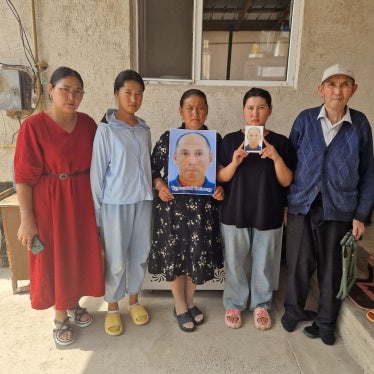“They don’t care about us,” the Somali woman told us. “They don’t rescue us when the women are crying for help.” She was describing the people who controlled her camp for displaced people in the capital city, Mogadishu. In fact, the voices of Somalia’s displaced have been regularly ignored, and often actively silenced.
It is an important time to listen to them. On 7 May 2013 a conference is being held in London, co-hosted by the British government and its Somali counterpart, which offers a real chance to advance the interests of Somalia's people. Its key issues are reform of the justice and security sectors, including the police, and tackling sexual violence. The success of this agenda will in part be measured by how these reforms improve the lot of the displaced.
Somalia's long crisis entered a new stage in 2011-12 when, amid a fresh eruption of fighting and widespread famine, tens of thousands of Somalis fled towards the capital in search of a safe haven. Many squeezed into overcrowded camps scattered throughout the city, where the environment was hostile and abusive. These displaced Somalis, already suffering as a result of their sudden flight, faced a host of new traumas: among them beatings, rape, diversion of food aid, restrictions on movement, and discrimination based on clan affiliation. The camp community leaders who tried to set up committees to raise such concerns were sometimes detained by officials as punishment. Many of these serious abuses are documented in a new Human Rights Watch report, Hostages of the Gatekeepers: Abuses against Internally Displaced in Mogadishu, Somalia (29 March 2013).
Somalia's former authorities, the Transitional Federal Government, their forces and allied militia, were wholly unaccountable for abuses against displaced people. Private individuals, including the omnipresent and powerful camp managers - or “gatekeepers” as they are known - took advantage of this, frequently overreaching their own power and suppressing attempts to protest against violations.
The father of a young woman who was raped by four men in government military uniform told us: “We don’t know anyone here. We are new to Mogadishu, so we didn’t try to go to justice, because the commander was harassing us at the time my daughter was raped. So how I can trust anyone here? We must keep silent.”
The gatekeepers very often have links to a militia that in turn is connected either to a powerful clan or to the local authorities. Several displaced women said they felt hostage to these gatekeepers. In many camps, the gatekeepers wield great power over the residents. Everything from what the residents can say, how they organise, who they have access to, how they manage their day-to-day lives, including access to food and shelter, is controlled.
“I tried to go to the camp commander, Mohamud, and tell him about the abuse of my son and wife,” one man told us, describing how his son and wife were beaten while they collected water. “But he ignored me. And when I tried to inform him about what happened his soldiers tried to beat me.”
A call to account
Under the new Somali government of President Hassan Sheikh Mohamud, it's vital that officials respond to the needs of the displaced people in Mogadishu. This starts with hearing their concerns and improving their protection, something that Somalia’s international partners also need to support. The government has a plan to relocate the displaced - who number between 180,000 and 370,000 - to new camps on the city's outskirts. This is an opportunity, but only if their rights and needs are not made a priority, without that, the plan could also heighten their suffering and increase abuse.
In response to the HRW report, President Hassan Sheikh has reiterated his personal commitment to the “restoration of civil security in Somalia and to holding to account any who are found abusing human rights.”
But to ensure protection of the displaced, the government needs to take concrete action. For example, establishing an accountable, competent police force should be central to the reform efforts. And if the government is serious about improving the situation of displaced people in its proposed relocation plan, it should lay out specific measures to improve security around relocation sites and identify those who are most vulnerable.
Donors supporting the security sector in Somalia should also be making clear that the creation of accountable security forces, particularly an accountable civilian police force, is urgent, and that the success of the new government will in part be judged on how well it reforms its security forces. The London conference, where detailed plans for these reforms are to be developed, is a unique opportunity for these issues to be prioritised.
Somalia's displaced population is among the most vulnerable communities in the world. They should be able to trust the new authorities. But if their prospects are going to be improved, they must also be given the voice to speak out when the authorities fail to protect their basic rights - and Somalia's government should be held to account for these failings.
Jamie Vernaelde is a senior associate in the Africa division and Laetitia Bader is a researcher in the Africa division.






